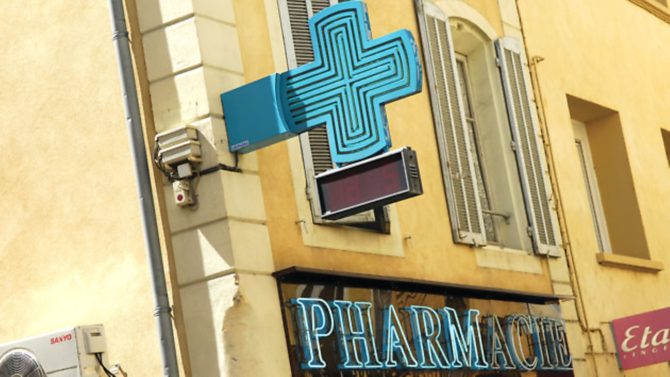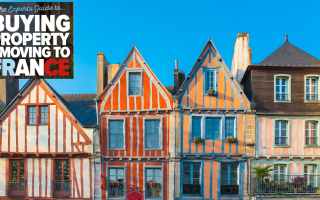Visiting a French pharmacy

Often a pharmacy is the first port of call if you are ill in France. With all the medicines, pills and lotions you could need, plus expert medical advice thay could be a good alternative to the doctor. Here is a basic guide to the role of the French pharmacy
FRENCH PHARMACIES
There are more than 23,000 pharmacies across France, even most rural villages have one. The network is made up of small independent pharmacies owned by qualified pharmacists who will have studied six to seven years to obtain their degree. They take the same foundation training as trainee doctors and other health care clinicians, and in the final year must write a thesis on a specialist subject.
French pharmacists believe their role is as much to advise and educate their customers as it is to supply medicines. They generally have regular contact with their customers, especially in smaller towns and villages, and in many cases are the first port of call for advice on ailments, before doctors, such is the level of trust and respect they command. An important part of their training is centred on what is called ‘l’éducation thérapeutique du patient’ (patient therapeutic education), which is all about educating people in terms of raising awareness of health issues and diseases, ensuring appropriate use of medicines, and recognising symptoms and side effects.
CESPHARM (the Comité d’Éducation Sanitaire et Sociale de la Pharmacie Française) supports them in this mission, disseminating information and organising campaigns (for example, this summer, how to stay well during a heat wave).
MEDICINES
French pharmacies, like a French person’s medical cabinet, are well stocked. Whatever the ache, pain or rash – ears, throat, feet, eyes, stomach – you name it, the pharmacist will whisk a strange-named remedy out of the seemingly endless behind-thecounter drawers. And there’s the rub. You will have to ask for the medicine, as French pharmacists, being the professionals they are, like to interact with the customer and quite possibly ask a few questions to make sure they are giving you the very precise treatment needed for your specific problem. Which means you will need to know a minimum of French or learn some of the basic brand names – for example Doliprane is paracetamol, Advil is ibuprofen, Biseptine is antiseptic cream – and you will have to ask out loud for certain products that in the UK you prefer to grab swiftly and discreetly from the shelf for yourself!
BEAUTY PRODUCTS
While medicines account for around 80% to 90% of sales, French pharmacies also sell a wide range of natural health and beauty products, usually enticingly displayed in the open free-serve space. These products will always have a beneficial health element, such as organic, natural or therapeutic ingredients, or protective properties. So while you will find lip balm and lavender oils, you won’t find mainstream cosmetics or false nails. Equally, the pharmacist will know the products on sale and have verified their natural composition or therapeutic benefit.
Most pharmacies also stock a range of animal health care products, including flea collars, vitamins and tic treatments, which are usually slightly cheaper than they would be at a veterinary surgery.
PAYING FOR YOUR MEDICINES
Although the pharmacist is usually capable of advising which medicine you need, he or she may well suggest you go to the doctor in order to obtain a prescription. Most medicines are entirely or partially free with a prescription.
This payment method works through what is called the carte vitale system – essentially a national health card carrying your personal details, which is the gateway to the French health care system. It is arguably the first administrative piece of paper (or plastic) you should apply for on moving to France (apply at the local CPAM – Caisse Primaire d’Assurance Maladie – where you can find out what to do).
In the pharmacy, simply hand over the prescription and your carte vitale, and quite likely you won’t have to pay a penny. You may also be asked on the first visit to a pharmacy for details of your mutuelle – this is the top-up private insurance that most French people, and those living in France, take out to cover some, or all, of the remaining percentage to be paid for medicines and health care, or to pay for treatments that aren’t included in subsidised French health care. Details of your mutuelle are entered into the system and you won’t normally be asked for them again on subsequent visits. You will pay up front any costs not covered by the state, and are reimbursed a few days later directly into your bank account by your mutuelle. Find out how to access the French health care systemPRICING OF MEDICINES
Medicines are strongly subsidised by the French welfare state, which some believe leads to an over-readiness on both the part of patients to ask for them, and doctors to prescribe them. Pharmacists see their role at the end of the line as one of controlling supply and keeping a check on patients’ use of medicines – as mentioned above, their relationship role often means they are better placed to spot developing patterns or problematic side effects.
The French state sets the price of prescription medicines, and at the start of 2015 raised the payment made to pharmacists per box of medicine from €0.53 to €0.80, rising to €1 from 2016. in return, pharmacies have agreed to aim to increase the sale of generic products, as opposed to branded products, to 85%, and to lower the margins they take on specific medicines sold (these follow a sliding scale downwards according to the price of the product). They have also undertaken to add instructions relevant to individual patients on how to administer the medicines or drugs, should patients have concerns.
With the French government aiming to reduce the health care budget, which will inevitably have a knock-on squeeze on medical supplies, the FSPF (Fédération des Syndicats Pharmaceutiques de France) were happy to reduce margins – which are greater for more expensive medicines likely to be more widely hit by cuts – for the guarantee of a higher set payment on all medical products.
When it comes to pricing non-medical products, pharmacies are free to set their own margins and therefore have more control over potential revenues from this sales platform.
Here are 22 French words that could help with a visit to the doctor or pharmacy in France
Share to: Facebook Twitter LinkedIn Email


